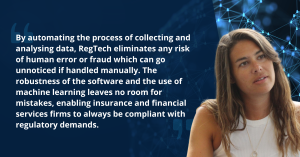By adopting RegTech, businesses can efficiently meet regulatory requirements with greater accuracy and less manual effort. Tasks like identity verification, due diligence, and compliance checks—once time-consuming and prone to error—are now automated for faster, more accurate results, reducing reliance on cumbersome processes and enhancing compliance adherence. This streamlining leads to quicker onboarding and more seamless relationship building. A great example of this comes from CNA Hardy’s use of RegTech, with Andy Clements, Head of Distribution, Sales & Marketing emphasising; “The REG Network has helped us to dramatically improve the efficiency of our broker onboarding process, oversight and customer experience.”
Furthermore, automated compliance processes extend throughout the entire customer lifecycle, offering continuous counterparty risk monitoring and 24/7 due diligence on trading partners. By leveraging real-time data and automated checks, businesses can maintain an ongoing, proactive view of their relationships, ensuring they stay compliant at all times. This continuous oversight not only mitigates risks associated with trading partners but also ensures that regulatory obligations are met without disruption.
As Clements adds; “The efficiency saving is being reinvested in more time spent with brokers and clients, strengthening relationships and delivering our specialist solutions. It’s a great example of how technology can greatly enhance outcomes for insurers, intermediaries and policy holders.” This level of ongoing risk monitoring fosters faster, smarter and safer trading, with the peace of mind that comes from knowing counterparty relationships are constantly being assessed. Ultimately, this enhances long-term business relationships, providing a solid foundation for sustained success.




















